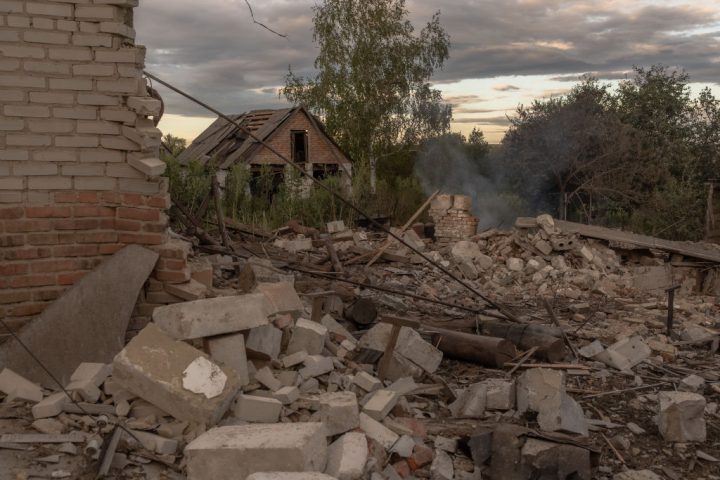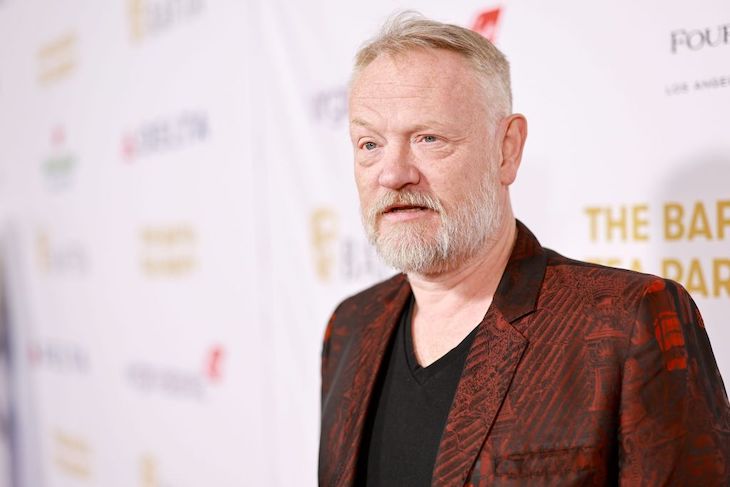In the sprawling and unlovely village of Billopilya, only five miles from Ukraine’s border with Russia, when death comes, it comes from the skies. Moscow had been targeting the hardscrabble settlement with glide bombs – known here as KABs – ever since Ukrainian troops smashed their way into the Kursk region on 6 August.
Vladimir Putin’s troops may be struggling to contain the estimated 6,000 Ukrainian soldiers now in Russia proper. Kyiv’s forces have seized a salient of land that encompasses more than 1,000 square kilometres. But even as Moscow slowly musters the forces to fight back against the incursion, it has ratcheted up attacks on Ukrainian civilians in apparent revenge for the surprise cross-border attack.
The road to Billopilya was potholed and almost suspiciously quiet
When I visited the village over the weekend, the few locals who had not fled to safer areas were on edge. Sasha, a 63-year-old construction worker, gestured to the house next door. Its roof had been blown off by a glide bomb a few days earlier and its walls had collapsed. ‘I was asleep in bed when this happened,’ he said shaking his head. ‘This is the way we live now.’
Even before the full-scale war between Russia and Ukraine began, life in Billopilya had not been easy. With the collapse of Communism and the local agricultural cooperatives many of the young people had moved to the cities or abroad looking for better prospects. But Sasha, who makes a living doing odd jobs and construction for whoever will pay him, and his wife Alla, 55, decided to stay.
Then in February 2022, Russian tanks and armour made a push for Sumy, the region’s capital, and Kharkiv, 130 miles to the east. They were eventually pushed back after heavy fighting. Ties with Russia, where many of the locals had family and friends, were cut.
‘There used to be a bus to Kursk that came right past here,’ Zhenya, 60, one of Sasha’s neighbours said. ‘But now if you drive up the road it’s all minefields and trenches.’
Zhenya’s house was also damaged by the glide bomb that fell in the street. He was using an angle grinder and a welding machine to put up metal sheeting.
I had set out that morning with a friend and colleague, in his 25-year-old Skoda from Sumy, an hour away. The Skoda had been covering the war since 2014 and was showing signs of wear. The road to Billopilya was potholed and almost suspiciously quiet. We passed a few dusty checkpoints, many of them unmanned, but there were almost no military vehicles.
The big fighting in the Kursk salient was happening about 15 to 20 miles east from where we were and rumours were circulating of blown-up bridges, Ukrainian reconnaissance groups cut off by Russian troops, and bodies in the streets. But the Ukrainian Army had blocked access to all but the most well-connected.
When we arrived in Billopilya the streets were almost empty. A shabby row of five-story housing blocks – known as ‘khrushchevki’ in this part of the world because they were commissioned by the former Soviet leader – seemed to have been abandoned. Outside a police station a few officers were standing around smoking. When we pulled up outside, Sasha and Alla, his wife, came out to chat. Alla had been cutting up cucumbers in the kitchen for their lunch.
Just then a neighbour came running over. She had been monitoring the messaging app Telegram. ‘KAB, KAB,’ she shouted. ‘Get inside.’ We shuffled into the house. There was a kitchen that was in good need of a clean, and a dark, dank cellar.
We opted for the bathroom, which had in it a cheap Russian-made washing machine and a jar with cigarette butts in it. We sat on the edge of the bath. Alla’s hands were trembling. There was an explosion. And, then, a few seconds later another. They were not close, but not too far away either.
We went into the kitchen and began to chat. Next to the kitchen was a bedroom with a large nature-scape plastered onto the wall, the sort that went out of fashion in the West in the 1970s.
Eventually, as we turned to leave, there was another shouted alarm. This time there were also two impacts, but closer. The village was being targeted, so we hopped into the Skoda and headed back to town. Later we learned that one of the glide bombs had hit the railway station, the other, a house. Two people had been injured.
The next evening, back in the regional capital Sumy, report of a new attack came through. Another glide bomb had landed on Billopilya. It had claimed the life of a 33-year-old man and seriously injured his daughter. The Ukrainian emergency services posted a video on Telegram of them digging the 15-year-old girl out of the rubble. Her dead father lay nearby.
According to the report two other people had been injured: an unnamed 63-year-old man and a 55-year-woman. The ages matched. So we called Sasha and Alla. ‘It was not us,’ Alla said. ‘This time God was with us.’







Comments